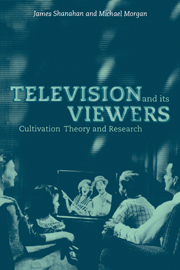Book contents
- Frontmatter
- Contents
- List of figures
- List of tables
- Foreword by George Gerbner
- 1 Origins
- 2 Methods of Cultivation: Assumptions and Rationale
- 3 Methods of Cultivation and Early Empirical Work
- 4 Criticisms
- 5 Advancements in Cultivation Research
- 6 The Bigger Picture
- 7 Mediation, Mainstreaming and Social Change
- 8 How does Cultivation “Work,” Anyway?
- 9 Cultivation and the New Media
- 10 Test Pattern
- Methodological Appendix
- References
- Index
7 - Mediation, Mainstreaming and Social Change
Published online by Cambridge University Press: 22 September 2009
- Frontmatter
- Contents
- List of figures
- List of tables
- Foreword by George Gerbner
- 1 Origins
- 2 Methods of Cultivation: Assumptions and Rationale
- 3 Methods of Cultivation and Early Empirical Work
- 4 Criticisms
- 5 Advancements in Cultivation Research
- 6 The Bigger Picture
- 7 Mediation, Mainstreaming and Social Change
- 8 How does Cultivation “Work,” Anyway?
- 9 Cultivation and the New Media
- 10 Test Pattern
- Methodological Appendix
- References
- Index
Summary
In the previous chapter, we presented evidence for an overall cultivation effect, but we also found a considerable amount of variance across the studies. That is, there was more variance in the meta-sample than what we would expect if the observed differences in results across studies were due to nothing more than chance. Also, we did not find a specific moderator for cultivation relationships, although many plausible candidates were tested. However, cultivation differences across liberals, moderates and conservatives were suggestive. The “missing moderator” problem suggests that we need different data explorations to think about what might be causing some studies to reveal stronger or weaker results.
The theory we presented in earlier chapters suggests that mainstreaming analyses may provide one answer. Although mainstreaming explains differential cultivation patterns across subgroups within specific studies, it may also help shed light on variations in results across studies. But, as we have pointed out above, it is not really possible to deal with mainstreaming within the guidelines of a meta-analysis (because meta-analyses do not provide “baseline” estimates of responses to dependent variables; they only provide estimates of relationships between TV exposure and dependent variables). Thus, to see whether mainstreaming helps explain across-study variance, one needs access to data that do allow examination of baseline estimates. This chapter looks at data that can help us to answer these questions.
- Type
- Chapter
- Information
- Television and its ViewersCultivation Theory and Research, pp. 137 - 171Publisher: Cambridge University PressPrint publication year: 1999



